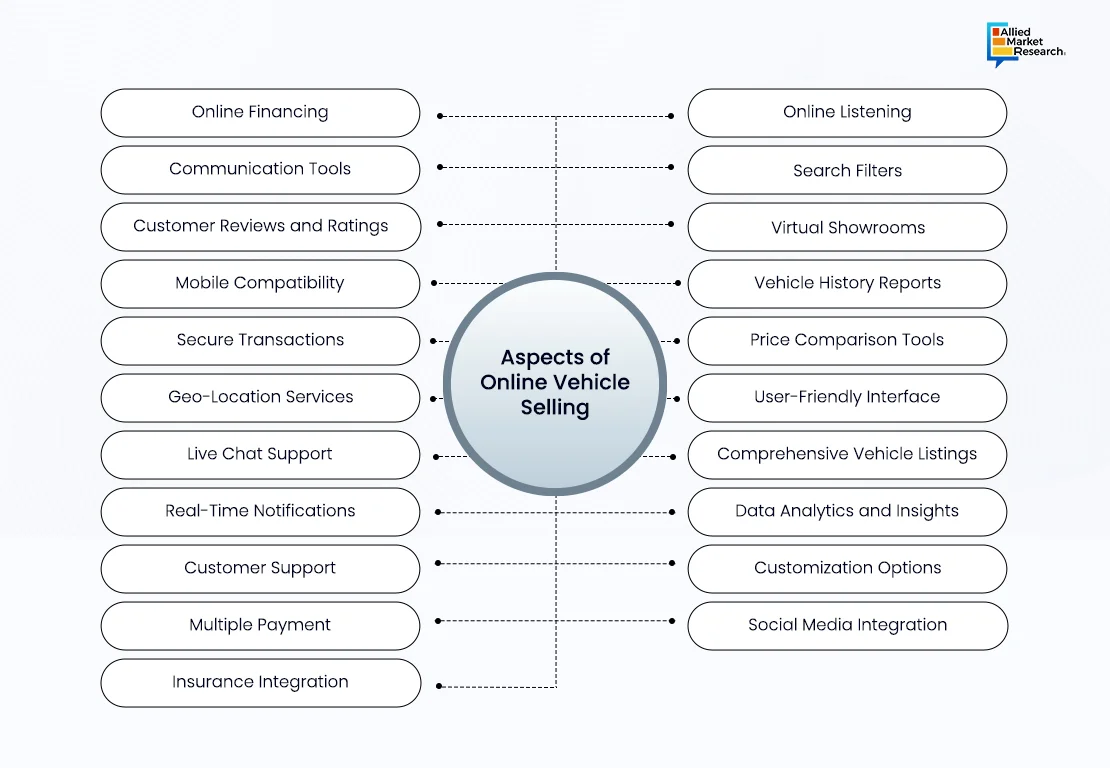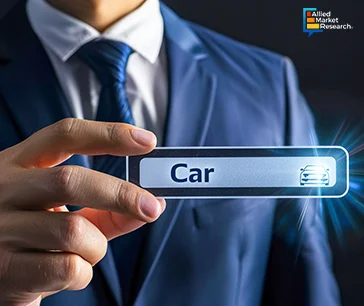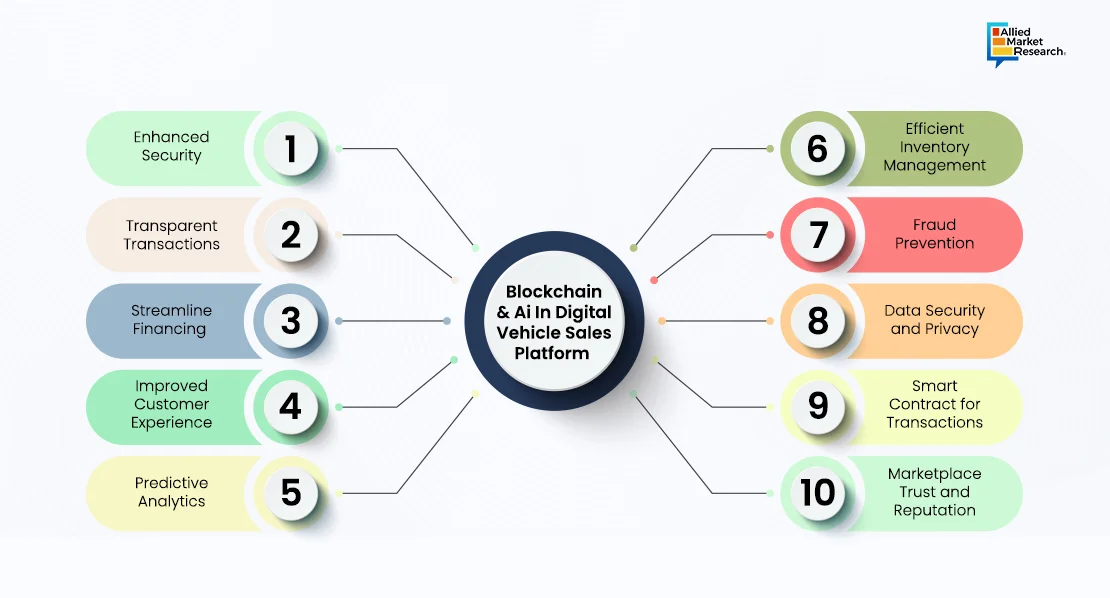Rise of Digital Automobile Sales: Driving into the Future

Digital automobile sales are currently at an established stage of development, with various automotive manufacturers, dealerships, and third-party platforms offering comprehensive digital sales & service solutions to customers. This includes established players such as Tesla, who pioneered direct-to-consumer online sales, along with traditional automakers and online car marketplaces that have adapted to the digital landscape.
Approach of the Market Players
The current state of digital automobile sales is significantly advanced, with numerous automotive brands and dealerships embracing digital platforms to cater to the evolving demands of consumers. Traditional automakers such as Tesla, BMW, and Audi have been at the forefront of this transformation, leveraging digital channels to enhance the car-buying experience for their customers.
In addition to traditional automakers, online car marketplaces such as Carvana, Vroom, and Shift have emerged as key players in the digital automobile sales landscape. These platforms offer a wide selection of vehicles, transparent pricing, and streamlined purchasing processes, hence catering to consumers who prefer the convenience of online shopping.

Digital automobile sales platforms offer a streamlined experience for buyers and sellers, featuring intuitive interfaces, comprehensive vehicle listings, and advanced search filters. Buyers benefit from virtual showroom experiences, transparent vehicle history reports, and price comparison tools, along with integrated financing and insurance options simplifying the purchasing process. In addition, communication tools facilitate negotiation and secure transactions ensure data safety. With mobile accessibility and real-time notifications, users stay updated on listings & inquiries. Moreover, consumer support and live chat services offer customer assistance, while geo-location features aid in tailoring promotions based on location. Furthermore, social media integration and customization options enhance the user experience, supported by data analytics for sellers.
Technological Breakthroughs Shaping the Market Landscape
Recent technological breakthroughs in the industry are propelling the advancement of digital automobile sales. Companies are continually enhancing website and mobile app functionality to provide a seamless and intuitive user experience. In addition, integration of features such as 360-degree vehicle views, interactive configurators, and live chat support is enabling customers to explore vehicles in detail and make informed decisions. For instance, Asbury Automotive Group Inc., a U.S.-based auto dealership company, introduced Clicklane in December 2020. It is a comprehensive communication technology ecosystem which offers complete car selling and purchasing experience. To develop this platform, Asbury collaborated with Gubagoo, a software company that provides digital retailing services to car dealers.
Moreover, extended reality (XR) technologies are being integrated into digital automobile sales platforms to create immersive virtual showroom experiences. These technologies allow customers to take virtual test drives, visualize customizations, and even interact with virtual car models. Mercedes-Benz is one of the first car companies to introduce a virtual reality (VR) showroom. In addition, the company has created smartphone apps which offer vehicle functionalities through interactive experiences.

Overcoming Obstacles: A Path Ahead
Despite the advancements, challenges persist in terms of technical limitations and issues associated with integration within existing technologies. One of the key challenges preventing the exponential rise of digital automobile sales is lack of seamless integration with backend systems for inventory management, financing, and customer relationship management. Integrating disparate systems and databases poses complexities which require careful planning and execution to ensure a smooth and efficient workflow. Furthermore, it is important to maintain data security and privacy protection to prevent unauthorized access or data breaches. Safeguarding customer information and financial data is critical to building confidence among consumers with increasing reliance on digital platforms for car sales.
To overcome these challenges, stakeholders in the digital automobile sales market are expected to embrace precise strategies. Seamless integration of technologies within existing systems can be achieved by thorough testing and a standardized set of protocols, which ensures compatibility and uniformity. In addition, efficient data synchronization is an absolute necessity for seamless integration, as it detects and resolves discrepancies immediately. Moreover, to ensure data privacy, multi factor authentication (MFA) and network access control (NAC) solutions are the foremost requirement. Developing an incident response plan is a crucial step to minimize damage post breach.
Upleveling Via Blockchain and AI
The integration of emerging technologies such as and holds immense potential for enhancing the capabilities of digital automobile sales platforms. For instance, blockchain technology is being leveraged by Ford, Renault, BMW, and General Motors to create secure and transparent transactions within the automotive ecosystem. Smart contracts powered by blockchain automate and enforce agreements between buyers, sellers, and third-party service providers, ensuring trust & transparency throughout the transaction process. In addition, the technology helps combat issues such as vehicle fraud, counterfeit parts, and odometer tampering by providing an immutable record of vehicle history & ownership. Furthermore, AI plays a pivotal role in providing personalized recommendations and customer services. AI algorithms analyze vast amounts of customer data, including browsing behavior, purchase history, and preferences, to offer tailored product recommendations & assistance. Virtual assistants powered by AI engage with customers in real-time, answering queries, providing information, and guiding them through the car-buying journey.

Blockchain ensures secure and transparent transactions through digital automobiles sales platform by providing a tamper-proof ledger system, thereby fostering trust and reducing fraud risk. This transparency extends to vehicle history and ownership records, empowering buyers with comprehensive information for informed decisions. The immutability and encryption techniques of blockchain ensure the privacy of sensitive data, thereby enhancing trust of customers upon these platforms. Furthermore, AI enhances the customer experience through personalized support and streamlined processes. Chatbots powered by AI offer instant assistance, schedule test drives, and facilitate transactions. Moreover, AI-driven predictive analytics optimize inventory management and pricing strategies, thus improving sales outcomes for sellers.
Pioneers of the Adoption of Digital Sales
The adoption of digital automobile sales is experiencing steady growth, with rising number of consumers opting for online car-buying experiences. This trend has been particularly accelerated by the COVID-19 pandemic, which prompted social distancing measures and safety concerns, leading more people to explore digital channels for their distinct needs.
Early adopters of digital automobile sales encompass a range of industries and consumer segments. Urban people and individuals with a perception for technology are among the first ones to embrace purchase of automobiles digitally. These consumers are acquainted with online shopping and the efficiency of digital transactions. The younger generations, including millennials and generation Z, are influential drivers of digital adoption in various industries, including automotive. These consumers frequently research and purchase products online, including cars. Businesses involved in fleet management and commercial transportation are among the early adopters of digital automobile sales. These companies require streamlined procurement processes and fleet management solutions to efficiently manage their vehicle fleets. The attractive attributes offered by digital platforms include bulk purchasing, fleet customization options, and integrated management tools
Scope for Enhancement
While the adoption of digital automobile sales is on surge, lack of trust upon digital platforms continues to remain a substantial concern, which demands attention. The concern remains more prevalent in developing nations, where digitalization has not been established thoroughly. This presents an opportunity for several automobile dealers to improve their services and acquire a distinct position in the market. They are expected to maintain transparency during the entire purchase process - from selection to delivery. Several customers have experienced delivery of counterfeit vehicles from digital platforms. In such instances, in-person interaction is projected to boost the trust of customers. Provision of human counselling during the entire digital exploration journey holds the potential to acquire traction from customers and help them make more informed decisions. Technology combined with human synergy is expected to be an excellent approach toward the rise of digital automobile sales.
Prospective for the Future
In the digital age, customers search for unique & personalized experiences, and digital automobile sales are no exception. Future digital platforms are anticipated to offer enhanced customization options, allowing customers to configure and order vehicles tailored precisely to their preferences. For instance, in August 2020 Mahindra Auto, an Indian automotive manufacturing corporation, launched a separate car customization website for their range of SUVs.
In addition to traditional ownership models, the future of digital automobile sales is projected to witness the widespread adoption of subscription-based models and mobility services. These models offer consumers flexible ownership and usage options beyond traditional car ownership, catering to evolving lifestyles & preferences. For instance, subscription-based car services allow customers to access a fleet of vehicles on a subscription basis, paying a monthly fee that covers maintenance, insurance, and other associated costs. This model appeals to individuals who value flexibility and convenience, allowing them to switch between different vehicle models based on their needs and preferences. Companies such as Toyota and Porsche Drive are providing subscription-based car services to their customers.
Similarly, mobility-as-a-service (MaaS) platforms integrate various transportation options, including ridesharing, car-sharing, public transit, and micro-mobility services, into a single digital platform. Customers are able to seamlessly plan and book multi-modal journeys, paying for transportation services on a pay-per-use or subscription basis. Experts across the automotive industry anticipate continuous growth and mainstream adoption of digital automobile sales, driven by advancements in technology, changing consumer behaviors, and industry trends toward digitalization. Development roadmaps prioritize improving user experience, expanding product offerings, and enhancing backend systems to support scalable & efficient operations. For instance, automotive manufacturers and digital platforms are investing in user-friendly interfaces, intuitive navigation, and seamless integration with backend systems to enhance the digital automobile sales experience. Stellantis Uconnect 5 is considered as one of the best car infotainment systems, offering cutting-edge driving experience. Furthermore, efforts are underway to expand product offerings to include a broader range of vehicle types, financing options, as well as ancillary services such as maintenance, insurance, and roadside assistance.
In conclusion, digital automobile sales represent a transformative shift in the automotive industry, offering consumers greater convenience, flexibility, and transparency in the car-buying process. With ongoing advancements in technology and concerted efforts from industry stakeholders, digital automobile sales are poised to reshape the future of automotive retailing and drive toward a more digital and connected automotive ecosystem. For further insights, get in touch with AMR analysts!



